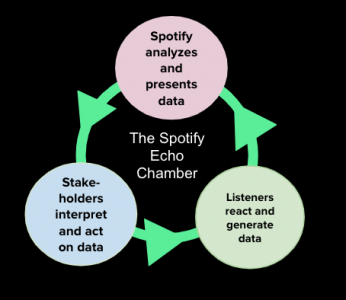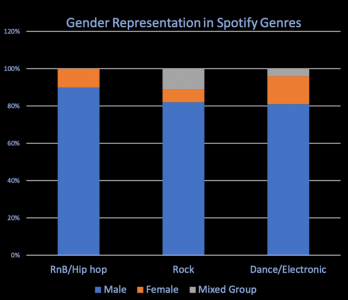What’s in My “Stream”?: Critical Knowledge for the Spotify User
by Sam Davidson
With 286 million users, Spotify is the world’s most popular music streaming platform, and there’s a good chance that you use it for your music listening needs [1]. What we don’t often consider when we’re putting in our earbuds is that Spotify is a powerful company that operates at the intersection of finance, advertising, technology and music. A few of its stakeholders include small peas like Facebook, Goldman Sachs, and Coca-Cola [2]. Spotify shares user data with all the major record labels–every click, skip, blip and bloop is used to strategically generate new content just for you… and to raise their stock prices too.
There is an intricate web of influences happening between all of these actors. What happens, unfortunately, is something that I refer to as “The Spotify Echo Chamber”. Spotify presents data to stakeholders, stakeholders respond to data and adjust new content, users react and generate new data…you get the picture [3]. It’s the kind of vicious cycle that lands Ed Sheeran with a world-record 2.5 billion streams of a single song [1].

Graphic created by Sam Davidson, source [3].
Forget “discovery”; at the heart of the platform is a recommendation system that chooses what songs find you! They do it with a suite of algorithms that work in concert, balancing each other’s strengths and weaknesses: Content filtering constructs a song profile based on characteristics like tone, timbre, harmony, and tempo, in order to find similar sounding songs [6]. A proprietary software called The Echo Nest is used for this process which also includes scouring the web for song mentions on blogs and websites in order to construct a comprehensive, socio-technical profile of each song [5].
Collaborative filtering finds songs that your friends like or songs in other user playlists with common content in order to generate recommendations. The creepiest of all, context-aware filtering, uses location and other real-time data synergized from apps on your smartphone. Put all these things together and they’ve got a “taste profile” just for you which they can also match with similarly profiled users [5].
So why all the concern? Spotify is not that bad, I mean, it’s no worse than doing ALL your shopping at Walmart, right? I argue that you owe it to yourself to know just what trade-offs you are making when you surrender your taste to machines.
There are several problems that these algorithms perpetuate. Spotify doesn’t broaden tastes, it narrows them by finding the path of least resistance: a passive, direct-to-consumer listening experience, devoid of cultural context. It also suppresses niche subgenres that don’t have a huge audience. This privileging of only popular genres can have adverse effects on minority groups who are often the artists working in diverse subgenres [7].
And since I mentioned privilege, gendering in Spotify recommendations is a well-documented problem. The algorithms have a nasty bias that makes male artists more visible than female artists [4]. The rock and hip-hop genres were shown to be particularly bad at presenting any kind of gender parity [8].

Graphic created by Sam Davidson, source [8].
So, what can you do? Well, consider alternatives like buying from artists directly through Bandcamp, Patreon, or other artist-centred platforms. Foster the arts by engaging with your local music communities and by actively cultivating your unique musical taste. Or just be wise to the veiled motives of the big players when you do indulge. Recommendation algorithms are everywhere these days, and you’d be smart to make up your own mind some of the time; your culture and your artists will thank you for it.
References
- Iqbal, M. (2020, Oct 30). Spotify Usage and Revenue Statistics Business of Apps. https://www.businessofapps.com/data/spotify-statistics/
- Chodos, A. T. (2019). Solving and Dissolving Musical Affection: A Critical Study of Spotify and Automated Music Recommendation in the 21st Century, UC San Diego Dissertations and Theses. escholarship.org/uc/item/2c27z9xk.
- Maasø, A., & Hagen, A. (2020). Metrics and decision-making in music streaming, Popular Communication, 18:1, 18-31, DOI: 10.1080/15405702.2019.1701675
- Pelly, L. (4 June 2018) Discover Weakly: Sexism on Spotify. The Baffler. thebaffler.com/latest/discover-weakly-pelly
- Prey, R. (2018). Nothing personal: algorithmic individuation on music streaming platforms. Media, Culture & Society, 40(7), 1086–1100. https://journals.sagepub.com/doi/full/10.1177/0163443717745147#articleShareContainer
- Ciocca, S. (10, October 2017). How Does Spotify Know You So Well? Medium. medium.com/s/story/spotifys-discover-weekly-how-machine-learning-finds-your-new-music-19a41ab76efe
- Lucero, M. J. (2020, January 03). Music streaming services mishandle our data-and our culture is paying for it. Quartz. https://qz.com/1773480/the-problem-with-how-the-music-streaming-industry-handles-data
- Eriksson, M. & Johansson, A. (2017). Tracking Gendered Streams. Culture Unbound: Journal of Current Cultural Research. 9. 163-183. 10.3384/cu.2000.1525.1792163.
- Watson, J. E. (1 Oct 2019). Reflecting of Spotify’s Recommendation System. SongData. https://songdata.ca/2019/10/01/reflecting-on-spotifys-recommender-system/
- Reuter, A. (16 Sept. 2019). Martina McBride ‘Felt Like We’d Been Erased’ When Spotify Didn’t Recommend a Single Female Country Artist. Billboard. www.billboard.com/articles/columns/country/8530121/martina-mcbride-spotify-female-country-artists-interview.
Written by Sam Davidson
Edited by Rachael Bradshaw
Featured image from www.songsimian.com used under Creative Commons

